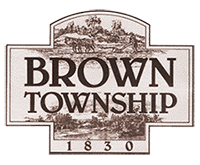Outdoor Fires
Open burning is any time you light an outdoor fire without a chimney or stack.
No Permit Required
Outdoor fires (i.e., recreational fires, campfires, outdoor fireplaces) must be fueled by clean seasoned firewood, natural gas, or its equivalent. Total fuel areas shall be no larger than 3 feet in diameter and 2 feet in height. The location for these types of open burning shall not be less than 25 feet from any structure and provisions must be made to keep the fire from spreading. These fires in an approved container (i.e., chimenea, fire bowls, and metal fire pits) shall not be less than 15 feet from any combustible structure or placed on any combustible structure.
Bonfires
A permit for open burning in Brown Township is required from the Norwich Township Fire Department for bonfires (see resources at bottom of this page). The fire dispatch center must be notified at the time the burning begins (instructions on permit). The fuel area of these fires shall be no greater than 5 feet in diameter and 5 feet in height. These fires shall not be conducted within 50 feet of any structure and provisions shall be made to keep the fire from spreading.
Larger Fires
Fires larger than a bonfire are still subject to the requirements above. In addition, notification, permitting, or both may be required by the Ohio EPA. Please review the Ohio EPA Frequently Asked Questions for more information on larger fires (see resources at bottom of this page).
Why is open burning a problem?
When burning refuse in burn barrels or open piles, the potential cost to your health, your home, your neighbors, and your environment far exceeds the price of adequate collection services. Open burning can release many kinds of toxic fumes. Leaves and plant materials send aloft millions of spores when they catch fire, causing many people with allergies to have difficulty breathing.
The pollutants released by open burning also make it more difficult to meet health-based air quality standards, especially in or near large cities. The gases released by open burning can also corrode metal siding and damage paint on buildings.
Under Ohio law, these materials may NOT be burned at any time:
- Garbage:
Any wastes created in the process of handling, preparing, cooking, or consuming food - Petroleum containing products:
Rubber, grease, asphalt, tires, auto parts, plastics, or plastic-coated wire - Dead animals:
Unless approved for control of disease by a governing agency.
Other restrictions:
- Open burning is not allowed when air pollution warnings, alerts or emergencies are in effect.
- Fires cannot obscure visibility for roadways, railroad tracks or airfields.
- No wastes generated off the premises may be burned. For example, a tree trimming contractor may not haul branches and limbs to another site to burn.
Does Ohio EPA ever allow exceptions to the rules?
Under certain circumstances, yes. However, to burn a prohibited material or set a fire in a restricted area, you must receive written permission from Ohio EPA before you begin burning. This may take two weeks.
Can a community regulate open burning?
Yes. However, local ordinances cannot be less strict than the state law.
What happens if I’m caught illegally open burning?
Ohio EPA has the authority to enforce the state’s open burning laws. Violations can result in substantial penalties. If you have any questions or would like to report a suspected open burning incident, contact your Ohio EPA district office or your local air pollution control agency. See the map in this brochure for the agency to contact in your area.
Health Concerns
Burning household waste produces many toxic chemicals and is one of the largest known sources of dioxin in the nation. Other air pollutants from open burning include particulate matter, sulfur dioxide, lead and mercury. These pollutants have been linked to several health problems, including asthma, respiratory illnesses, nervous system damage, kidney and liver damage, and reproductive or developmental disorders.
What You Can Do Instead of Open Burning
- Reduce the amount of waste you generate.
- Reuse items in another way.
- Recycle - Contact your waste disposal provider about curb-side pickup or drop-off locations for bulky or hazardous items.
- Compost yard trimmings and food scraps, while creating a natural, free fertilizer.
More Information:
For a complete copy of Ohio’s open burning regulations, contact:
Ohio EPA
Division of Air Pollution Control
P.O. Box 1049
Columbus, OH 43216-1049
(614) 644-2270
Resources
- Township Open Burning Standards can be viewed here
- Norwich Township Fire Department permit can be downloaded here
- Frequently Asked Questions can be viewed here
- A complete copy of Ohio's open burning regulations can be found here
- Report any kind of environmental violation (may include pictures) to the OEPA here

